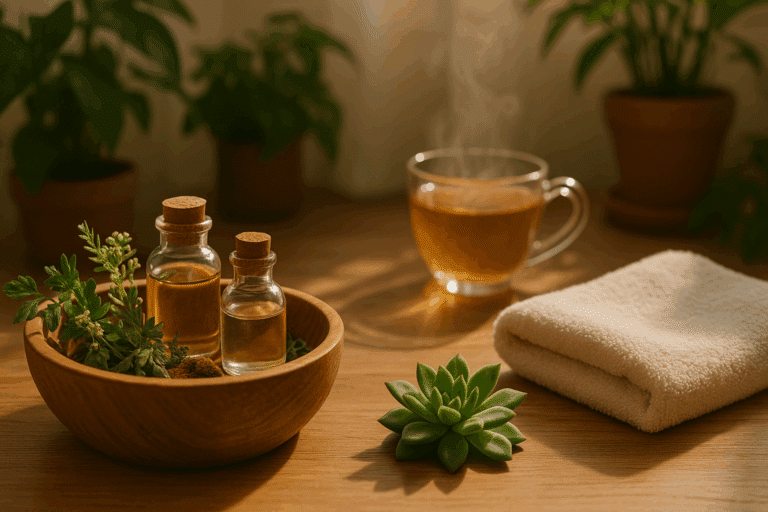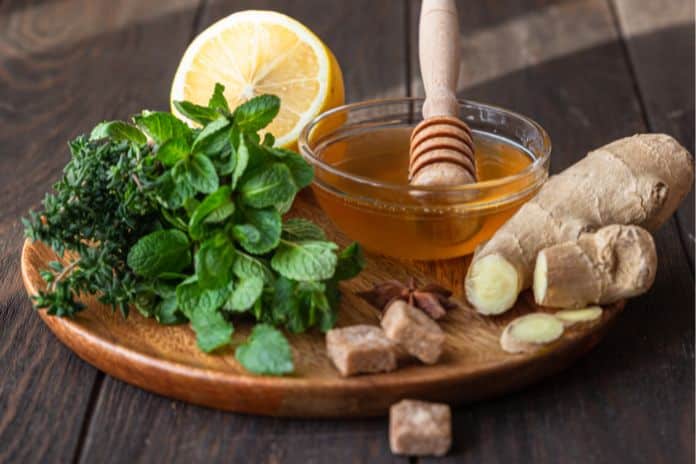7 Effective Cough Remedies for Adults You Should Try

When you’re dealing with a persistent cough, finding effective remedies can make a significant difference. It’s important to know what options are available and how they can help ease your discomfort. From staying hydrated to exploring natural solutions, there are several strategies to evaluate. Let’s explore these remedies and see which ones might work best for you in managing that bothersome cough.
Stay Hydrated: The Power of Fluids
Staying hydrated is essential, especially when you’re dealing with a cough. Proper hydration maintains moisture in your throat tissues, reducing soreness from constant coughing. Water helps deliver oxygen to your throat muscles, aiding in cell repair and pain relief. When you’re dehydrated, your throat can become more irritated, worsening your cough. Adequate hydration is crucial during cough-related health issues to support your body’s healing processes. Additionally, increased fluid intake can help flush out toxins, further supporting your recovery.
Drinking fluids, especially warm ones like herbal teas or broths, can thin mucus, making it easier to expel and reducing congestion. Plus, staying hydrated supports your immune system, speeding up recovery. Aim for low-calorie fluids and high-water content foods, like watermelon, to keep your hydration levels up. Avoid sugary or caffeinated drinks that might irritate your throat further.
Soothing Relief With Cough Drops
While hydration plays an essential role in easing cough symptoms, cough drops can offer targeted relief for sore throats and persistent coughs. These lozenges often contain menthol, which provides a cooling sensation that temporarily numbs your throat. However, be cautious with menthol; excessive use can sometimes worsen your cough.
In fact, excessive use of menthol cough drops may lead to increased cough severity. The effectiveness of cough drops can vary, with some people finding them no more beneficial than a placebo. Ingredients like eucalyptus and honey may enhance their soothing properties, but results can differ. Additionally, using a warm compress on the throat may complement the soothing effects of cough drops.
The Benefits of Using a Humidifier
Using a humidifier can greatly improve your comfort when you’re dealing with a cough. It adds much-needed moisture to the air, which helps relieve your dry throat and makes breathing easier. Keeping your environment humid can really enhance your overall respiratory health. Additionally, maintaining ideal indoor humidity levels can prevent the growth of allergens, which may worsen respiratory conditions.
Moisture in Air
When the air is dry, especially during colder months, a humidifier can be your best ally in maintaining respiratory health. By adding moisture to the air, it helps prevent upper respiratory infections and reduces your risk of catching the flu. Additionally, maintaining a healthy indoor environment can also reduce sleep disorders that may be exacerbated by dry air.
With ideal humidity levels, your coughs become more productive, making it easier to clear mucus. This added moisture soothes irritated airways, making breathing simpler and more comfortable. Regular cleaning of your humidifier is essential to prevent mold and bacteria buildup, ensuring that the moisture you’re adding to the air remains beneficial.
If you’re suffering from allergies, a humidifier can also alleviate symptoms by reducing dust mites and providing relief for irritated eyes. Overall, using a humidifier not only improves your cough productivity but also contributes to a healthier indoor environment.
Relieves Dry Throat
A humidifier can be a game changer for relieving dry throat irritation. By adding moisture to the air, it soothes and hydrates irritated throat tissues, helping reduce coughing and discomfort.
Here are some key benefits of using a humidifier:
- Moisturized air lubricates your airways, calming the cough reflex triggered by dryness. Additionally, staying hydrated is crucial for maintaining overall throat health.
- Both cool-mist and warm-mist humidifiers effectively relieve dry throat symptoms.
- Increased humidity thins mucus, making it easier to clear your airways.
- Humidified environments support respiratory healing during colds or flu, minimizing throat aggravation. Additionally, cool-mist humidifiers are recommended for children to prevent burns, making them a safer choice for family use.
Using a humidifier not only eases dry throat irritation but also contributes to overall respiratory comfort, making it an essential tool for your wellness routine.
Rest: Your Body’s Best Ally
Rest serves as your body’s best ally during illness, as it plays an essential role in boosting your immune system and speeding up recovery.
By allowing yourself to rest, you enable your body to focus its energy on fighting infections, reducing viral loads, and promoting the production of cytokines that combat pathogens. This also helps manage fever effectively and minimizes symptoms like fatigue. Additionally, during rest, the body may exhibit increased immune functions at night, which can exacerbate symptoms like nighttime coughing. While it won’t directly relieve your cough, adequate rest supports overall recovery and aids in airway clearance, which can lessen cough severity over time.
Additionally, staying home helps prevent the spread of germs, supporting both your health and that of your community.
Prioritize rest, and you’ll feel better faster.
Natural Relief: The Role of Herbal Medicine
After taking the time to rest and allow your body to heal, exploring natural remedies can offer additional support for your cough.
Herbal medicine provides a range of options that can help soothe your symptoms and improve your quality of life. Consider trying the following remedies:
- Thyme and Ivy: Reduces frequency and severity of acute cough.
- Honey: Known for its anti-inflammatory properties, it soothes coughs, especially during upper respiratory infections.
- Marshmallow Root: Traditionally used for coughs and sore throats, though further research is needed.
- Licorice: Contains compounds that may relieve coughing through its analgesic and antispasmodic actions.
These natural alternatives can offer relief while minimizing adverse effects, making them a valuable addition to your recovery plan. Additionally, studies have shown that BNO 1200 is effective in significantly improving cough severity and health-related quality of life in patients with acute cough.
Pharmaceutical Options: What to Consider
When considering pharmaceutical options for your cough, it’s important to understand the different types of medications available.
Over-the-counter options include cough suppressants, expectorants, and combination products. If you have a dry cough, look for suppressants like dextromethorphan, which work by suppressing the cough reflex. For a productive cough, an expectorant like guaifenesin can help clear mucus. However, studies show no proof that over-the-counter cough medicines are effective for coughs caused by viruses.
Be mindful of potential side effects, such as nausea and abdominal pain, and always check for interactions with other medications. Consider your age and overall health when choosing a product.
Although many OTC cough medicines exist, evidence supporting their effectiveness can be limited, so it’s wise to approach these options with caution.
Evaluating Your Cough: When to Seek Help
If your cough persists or is accompanied by troubling symptoms, it’s crucial to evaluate whether you need medical help. Here are some key indicators that warrant a doctor’s visit:
- Cough lasting more than three weeks or accompanied by fever
- Coughing up mucus, phlegm, or blood
- Difficulty breathing or experiencing chest pain
- Cough disrupting your sleep or eating habits
If you notice any emergency signs like choking or severe breathing trouble, seek immediate care. Additionally, coughs that do not improve at home should prompt you to seek professional advice.
Remember, a chronic cough lasting over eight weeks may indicate underlying conditions requiring professional evaluation.
Don’t hesitate to consult a healthcare provider if your symptoms persist or worsen over time. Your health is important, and getting timely help can make a difference.
Frequently Asked Questions
Can Allergies Cause a Persistent Cough in Adults?
Yes, allergies can definitely cause a persistent cough in adults. When you’re exposed to allergens, your airways may become irritated, leading to symptoms like coughing, sneezing, and postnasal drip. Identifying triggers can help alleviate this.
How Do Environmental Factors Worsen Coughing Symptoms?
Environmental factors worsen coughing symptoms by exposing you to irritants like smoke and pollutants. Cold, dry air and allergens can trigger your cough, while high humidity might promote mold, exacerbating your respiratory issues further.
What Lifestyle Changes Can Help Reduce Chronic Cough?
To reduce chronic cough, you can quit smoking, stay hydrated, maintain ideal indoor humidity, manage allergens, and eat a balanced diet. These lifestyle changes will help soothe your airways and improve overall respiratory health.
Are There Specific Herbs Known to Effectively Treat Cough?
Yes, specific herbs like thyme, ginger, and hyssop can effectively treat coughs. These herbs possess antimicrobial and anti-inflammatory properties, offering relief by soothing irritation and clearing respiratory passages. Incorporating them into your routine can help greatly.
How Long Should I Wait Before Seeking Medical Help for a Cough?
If your cough lasts longer than three weeks, it’s time to seek medical help. Even after one week, especially with other symptoms, consider consulting a healthcare professional for proper evaluation and guidance.
Conclusion
To sum up, finding relief from a persistent cough doesn’t have to be difficult. By staying hydrated, using cough drops, and incorporating a humidifier, you can soothe your symptoms effectively. Don’t forget to rest; it’s your body’s best ally in recovery. Consider herbal remedies for natural relief, and if needed, explore pharmaceutical options. Most importantly, keep an eye on your symptoms and seek medical advice if your cough persists. Take care of yourself and breathe easier!
References
- https://pmc.ncbi.nlm.nih.gov/articles/PMC2080754/
- https://pmc.ncbi.nlm.nih.gov/articles/PMC3205006/
- https://www.health.harvard.edu/staying-healthy/no-coughing-matter
- https://www.mayoclinic.org/diseases-conditions/chronic-cough/diagnosis-treatment/drc-20351580
- https://www.frontiersin.org/journals/pharmacology/articles/10.3389/fphar.2023.1230604/full
- https://www.medanta.org/patient-education-blog/the-importance-of-hydration-in-managing-coughs
- https://www.nutritionnews.abbott/nutrition-care/illness/how-hydration-can-help-you-recover-from-a-virus/
- https://www.mayoclinichealthsystem.org/hometown-health/speaking-of-health/7-ways-to-combat-coughs-and-colds
- https://inandouturgentcare.com/articles/3-surprising-tips-for-fast-cough-relief/
- https://pmc.ncbi.nlm.nih.gov/articles/PMC7197045/






